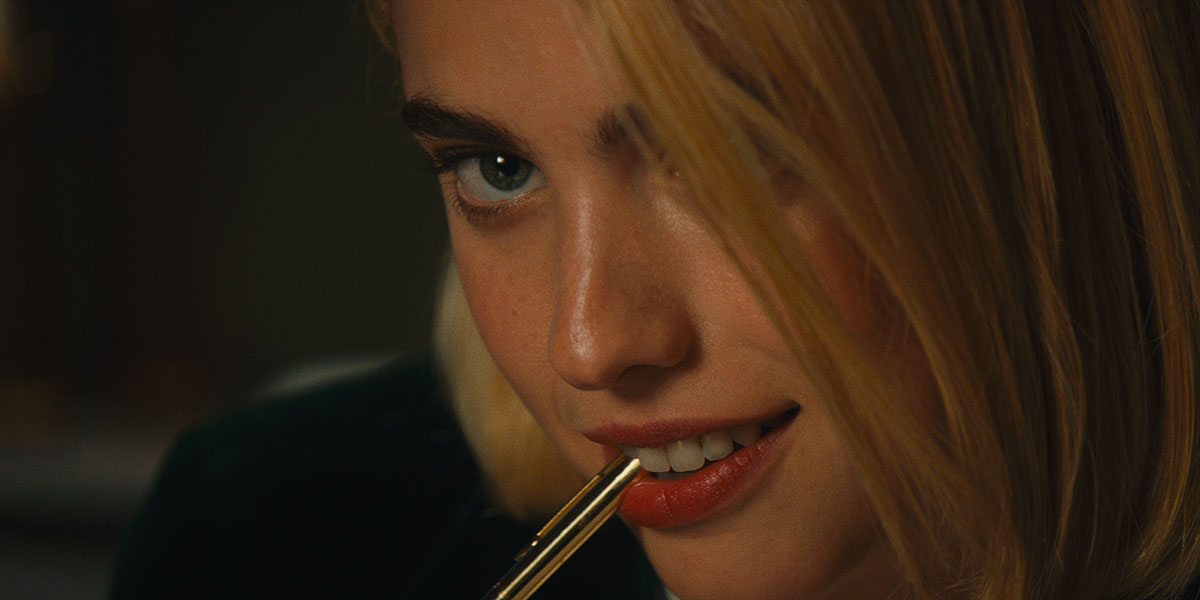“Everything is about sex, except sex, which is about power” is how the old saying goes, and it’s hard to think of a film that more perfectly encapsulates this dynamic than Sanctuary, Zachary Wigon’s intense, twisted, often surreally funny two-hander drama. Exploring the relationships between power, sex, gender, identity, and family pressure, Wigon’s direction brings a sleek, sophisticated visual flare to a razor-sharp script from Micah Bloomberg, resulting in a film that grips you from the opening moments and never lets go. Deeply personal, paradoxically comic and bizarrely sweet, Sanctuary is a fascinating exploration of interpersonal power dynamics that’s the perfect showcase for both its leads.
Starring Margaret Qualley and Christopher Abbott, Santuary follows Rebecca, a professional dominatrix who has been providing her services to wealthy daddy’s boy Hal (Abbott) for several years now. When Hal is set to inherit his father’s multi million-dollar company, he resolves to break off his arrangement with Rebecca before it can cause a public scandal for him down the line—but Rebecca isn’t willing to let her cash cow of a client go without a fight. Under the pretense of an ordinary session, Hal attempts to sever his ties to Rebecca and come out from under her influence for good, but it quickly becomes clear that though he may be the one with friends in high places, Rebecca is the one with the true power in their relationship.
What’s most impressive about Sanctuary is that it’s a two-hander in the truest sense of the term: besides Abbott and Qualley, there’s not a single other actor with dialogue in the film. Once we enter the confines of Hal’s ritzy penthouse hotel suite, we never leave—everything that follows is brewed from the delicious give and take of tension between Hal and Rebecca. And tension they have in spades—both young and unsure of what their futures hold, it quickly becomes clear that the clash between Rebecca and Hal is really about what the relationship represents to both of them, and what continuing or not continuing their arrangement would mean for their respective futures.
Abbot’s Hal is a deeply insecure, perpetually unsure of himself heir to an empire who’s desperately seeking guidance—guidance that Rebecca is all-too-aware she can provide. But while Hal has a subconscious (or conscious—he did, after all, seek out a dominatrix) desire for others to tell him what to do, he’s also hyper-aware of the exterior optics of a CEO paying a dominatrix for her services, and he’s determined to start his tenure as CEO with a clean slate. He tries, bless him, to assert dominance, but even when he has Rebecca with her hands tied (literally), he just doesn’t have the nerve or the confidence to make the tough call and break things off with Rebecca for good.
Abbott brings an intense charm and likability to this spineless character who could’ve easily been obnoxious and hatable in the hands of another actor—and while yes, he is privileged with a silver spoon, he’s also got a vulnerability and inexperience that makes him strangely endearing. Of the two characters, it’s almost always Hal at a disadvantage in their dynamic, which would seemingly make Rebecca the meatier, more scene-stealing role of the duo, but Abbott is able to bring a surprising intensity and power when he needs to—and delivers some of the film’s most memorable, emotional moments because of it.
But, of course, this is a two-person show, and as good as Abbott is, it’s Margaret Qualley who’s the obvious and undeniable breakout performance of the film. Like Hal, Rebecca is a character who seems very cut and dried at face value: she’s a confident, self-assured dominatrix who’s convinced herself (and the audience) that she has her pathetic client wrapped around her little finger. But once Hal makes it clear that he wants to end their arrangement, Rebecca’s cool façade crumbles, and we’re treated to a delightful, dizzying crisis as Rebecca scrambles to find a way to regain control and not lose her most reliable source of income.
In this respect, the script allows for Qualley to have an impressively dynamic peformance: she gets to chew the delicious, hyper-sexual, uber-confident conventional dominatrix dialogue in the film’s first half an hour, and she never truly loses that spark or confidence, but as the evening spirals futher and further out of control, we’re also treated to a more vulnerable, desperate, insecure Rebecca. Qualley walks this line beautifully—she puts on a brave face whenever Hal’s gaze is on her, but the second his back is turned, her face cracks and the whispers of desperation quickly seep through.
Together, these two young talents take an already impressive script and elevate it to new heights. Never has an hour and a half of two people talking in a hotel room been so intense, sexy, or bizarrely comedic, because while the film is understandably tense and twisted, it’s also got an unlikely sensibility to it that’s hard to describe other than “sweet.” It’s rare that the idea of genuine romance is explored in tales of power struggles like these, but the more time we spend with Hal and Rebecca, the more we realize that they are, in a strange way, perfect for each other.
It’s Wigon’s willingness to tap into the more unexpected, sugary-sweet sides of this otherwise icy, twisted tale that makes Sanctuary so memorable—that, and the impressive cinematographer Ludovica Isidori, whose active camera makes ample and creative use of a one-room set that could’ve otherwise become claustrophobic. Between Wigon’s direction, Isidori’s cinematography, and Bloomberg’s script, Sanctuary is an unexpectedly twisted yet charming tale of power and romance.
(featured image via NEON)









Published: May 19, 2023 05:40 pm